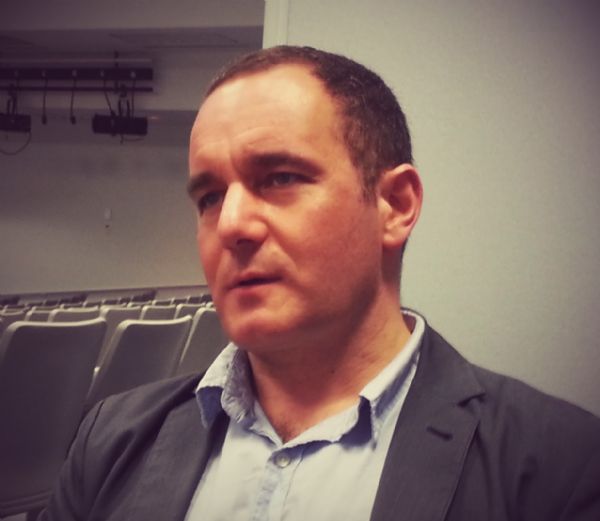|
Journalist and Author Christian Parenti at FSW lecture: Drought and environmental crisis exacerbate violent conflicts
|

Dr. Christian Parenti, author and journalist. Parenti's reporting was the subject of the award-winning HBO documentary called "Fixer: The Taking of Ajmal Naqshbandi" and he is the author of "Tropic of Chaos: Climate Change and the New Geography of Violence."
|
By Gina Edwards
Naples City Desk
Environmental catastrophes and climate change aren’t the driving factors behind conflict in war ravaged areas that are destabilized by cheap weapons and failed nation-states, but policy makers frequently overlook their impacts, journalist and academic Dr. Christian Parenti told audience members Thursday evening at Florida SouthWestern State College.
Parenti, a war correspondent who’s reporting in Afghanistan was the subject of an award-winning HBO documentary, offered up some examples from his reporting for his book “Tropic of Chaos: Climate Change and the New Geography of Violence”:
Afghan farmers told Parenti they preferred growing poppies for the opium trade to other crops because of the flowers’ drought resistance. In Kenya, Parenti witnessed how a historic drought has made who controls watering holes for cattle herds a political question that’s answered with AK-47s.
“In many parts of the world, climate change is already causing great suffering,” Parenti said in an interview.
More recently, the rise of ISIS should be considered in the context of food price shock, said Parenti, a contributor to The Nation magazine. Rural poor people are willing to follow radical leaders in part because of the environmental crisis impacting their economies.
Parenti said too frequently conflict and violence are looked at only in the context of religious and ethnic sources without looking at environmental causes. “This isn’t just some age-old thing,” Parenti said in reference to Sunni and Shiite Muslim conflicts. “If we don’t look deeper, we’re going to unintentionally exacerbate these conflicts.”
|

This story is free!
Subscribe -- And you'll get in-depth coverage of politics, business and people for only $4.99 a month.
Your grassroots subscription support goes right to the journalists producing the work.
View on your tablet, PC or phone.
Get a 7 day free trial when you click the blue Subscibe button!
View all the headlines available to subscribers of Naples City Desk
|
Parenti’s lecture was the third annual presentation in the Cornerstone Critical Thinking Series launched by FSW with nationally recognized speakers that seeks to prepare students with critical thinking skills that are necessary for college success. Thursday evening's lecture was live-streamed to more than a half dozen colleges. Associate Dean Dr. Kathy Clark said freshman are required to take the first year Cornerstone Experience course to learn to “solve problems, generate ideas and to speak and write from an informed perspective.”
Local political watchers saw FSW student Jacob Winge bring those skills to his campaign for the Collier County School Board this summer. Winge, a state past president of the Florida College System Student Government Association, was a panel member Thursday evening along with Dr. Thomas Buckingham, coordinator of FSW’s Academic Support Center, and Jennifer Hecker, the Director of Natural Resource Policy at the Conservancy of Southwest Florida.
Gary Price, former Naples City Council member and also a panelist for the lecture, told the audience he disagreed with Parenti’s conclusions about climate change solutions like carbon taxes, which he called regressive. “It didn’t work for Australia,” said Price, a partner and co-director of Magnus Capital Management, Fifth Avenue Advisors.
Price, a member of the lecture organizing committee, said Parenti’s perspective isn’t one that’s often heard in Southwest Florida, which is dominated by political conservatives. He said he gives Parenti credit because he’s forming his opinions based on eye witness reporting. “He’s been there,” said Price.
Naples tech entrepreneur Ed Caputo, the chairman of the organizing committee for the event, said colleges and universities place too much focus on sports. He said colleges bring vibrant intellectual debate to their communities and he said that was the goal of the series at FSW.
“Colleges should try to get people to think more about the world,” Caputo said.
Contact Gina Edwards at ginavossedwards@gmail.com or by phone at 239-514-1336
|

